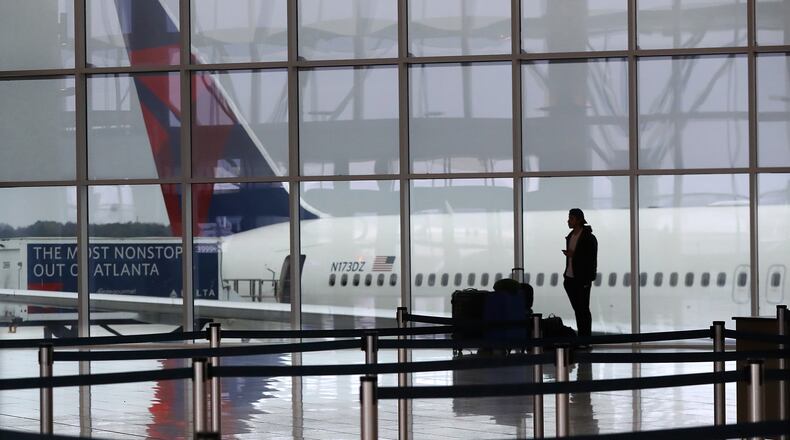Editor’s note: This article has been updated with additional details, including impact of loss on employee bonuses and timing of return to profitability.
Delta Air Lines had a net loss of $12.4 billion last year as air travel plummeted due to the COVID-19 pandemic, marking the company’s largest loss ever.
But its losses narrowed in the fourth quarter and Chief Executive Ed Bastian predicted the airline would return to profitability this summer.
“We expect by the spring as the vaccines continue to be distributed, the virus is in a more contained form, people are ready to start traveling again and feel more confident, that’s when we’ll be getting the added cash and revenues,” Bastian said in an interview with The Atlanta Journal-Constitution.
Bastian hopes to see spring bookings for travel into summer and fall, noting that such advance bookings are a source of cash for the airlines. Leisure markets and sun destinations are attracting the most business, while corporate travel will take longer to return.
The historic loss means no profit-sharing bonuses for employees, many of whom also had their pay cut by 25% for much of last year or took voluntary unpaid leave. A year ago Atlanta-based Delta paid out $1.6 billion in profit sharing to employees, amounting to about two months of pay.
Delta expects to get another $3 billion from the federal government from an extension of CARES Act stimulus funding for airlines approved late last year. Bastian said he expects to get the first installment this month and the rest later in the first quarter, and said 30% of the total will be in the form of a loan with 1% interest payable over 10 years.
That will be another infusion of cash to bolster the company’s coffers as it continues burning through $10 million to $15 million in cash a day. Delta has raised billions to last through the pandemic, including $9 billion in debt financing backed by its SkyMiles frequent flier program. It had about $16.7 billion in liquidity at the end of December.
That has helped the airline survive a 64% decline in revenue in 2020, including a 70% drop in passenger revenue and a 19% drop in cargo revenue.
Delta’s operating revenue declined to $4 billion in the fourth quarter from $11.4 billion a year earlier, an improvement from $3 billion in the third quarter and $1.5 billion in the second quarter. Its quarterly net loss narrowed to $755 million in the fourth quarter from its $5.4 billion loss in the third quarter and $5.7 billion loss in the second quarter.
The company reduced its full-year operating expenses by 27% by reducing staff through voluntary unpaid leave, 18,000 buyouts and early retirements, cutting ground workers’ pay, flying less, retiring jets, trimming operations and other measures. It had about 90,000 employees before the pandemic.
But the unprecedented decline in air travel caused Delta to swing from a $4.8 billion profit that made it one of the world’s most successful airlines in 2019 to its staggering $12.4 billion loss in 2020.
Credit: HYOSUB SHIN / AJC
Credit: HYOSUB SHIN / AJC
“We’ve been mindful of the fact that there won’t be a profit-sharing payout,” and the company is providing assistance to employees for financial planning and credit counseling, Bastian said.
About 10,000 employees are still on voluntary unpaid leave. The company has also seen an increase in COVID-19 cases among its workforce as the virus spreads across the country.
Delta continues to block middle seats on its planes through March 30 for social distancing and expects its flying to be down 35% this quarter compared with a year ago, resulting in a 55% decline in sellable flight capacity.
Delta President Glen Hauenstein expects a choppy recovery in the early part of the year, and later in the year “a sustained demand recovery as customer confidence gains momentum, vaccinations become widespread and offices reopen.”
Bastian said health measures like quarantine and travel requirements under the Trump administration have been mostly left to the states, making it “very, very choppy, very confusing to customers.” He added that he has already had discussions with the incoming Biden administration and hopes for “a stronger, more unified national approach toward managing the virus,” with clearer directives to open up travel.
As the airline recovers and adds back more flights, Bastian also said Delta won’t “need to backfill” its 20% reduction in staff entirely. “There’s a middle ground there,” he said.
Delta annual net income/loss
2020: $12.4 billion loss
2019: $4.8 billion profit
2018: $3.9 billion profit
2017: $3.6 billion profit
2016: $4.4 billion profit
Source: Delta Air Lines
About the Author
The Latest
Featured



